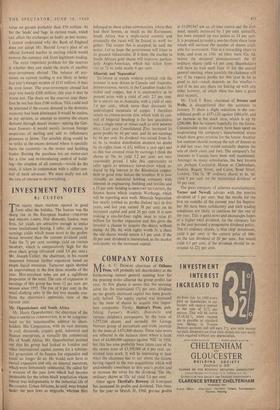INVESTMENT NOTES
By CUSTOS
MHE equity share markets opened in good I form after the holiday. The feature was the sharp rise in the European leaders—UNILEVER and PHILIPS LAMPS. Our domestic leaders were firm, for yields are attractive enough to entice some institutional buying. I refer, of course, to earnings yields which mean more to the profes- sional investor than the current dividend yield. Take the 71 per cent. earnings yield on UNITED DRAPERY, which is comparatively high for the store share group (dividend yield 3.8 per cent.). Mr. Joseph Collier, the chairman, in his recent statement forecast further expansion based on ample liquid resources. Turnover again showed an improvement in the first three months of the year. Hire-purchase sales are not a significant proportion of the total. The rate of expansion in earnings of this group has been 12 per cent. per annum since 1955. The rise of 8 per cent. in the retail clothing sales in the last two months con- firms the chairman's optimistic view of the current year.
Mr. Oppenheimer and South Africa
Mr. Harry Oppenheimer, the chairman of the ANGLO-AMERICAN CORPORATION, IS to be congratu- lated on his statesmanlike address to share- holders. His Corporation, with its vast interests in coal, diamonds, copper, gold, industrial and finance enterprises, is virtually the commercial life of South Africa. Mr. Oppenheimer pointed out that his group had looked to London and other international capital centres for a substan- tial proportion of its finance for expansion and could no longer do so. He would now have to curtail expansion and rely on internal resources, which were fortunately substantial. He called for a revision of the pass laws which had become Intolerable for the urban black population whose labour was indispensable to the industrial Iife of the country. Urban Africans, he said, were treated Under the pass laws as migrants, Whereas they
belonged to those urban communities, where they had their homes, as much as the Europeans. South Africa was a multi-racial country and eventually the races will be forced to work to- gether. The sooner this is accepted, he said the better. Let us hope the government will listen to its greatest industrialist. If it does, the market in South African gold shares will improve, particu- larly Anglo-American, which has fallen from
1 to 7$5; to yield nearly 6 per cent.
Minerals and 'Separation'
To 'invest in metals without political risk the investor is now driven to Canada and Australia. INTERNATIONAL NICKEL is the Canadian leader for nickel and copper, but it is unattractive at its present price with a yield of only 2.7 per cent. So is MOUNT ISA in Australia, with a yield of only 1.4 per cent., which more than discounts its undeveloped mountain of copper. I therefore return to CONSOLIDATED ZINC which with its con- trol of Imperial Smelting is far less speculative than a single mine or mines such as NEW BROKEN trit,L. Last year Consolidated Zinc increased its gross profits by 44 per cent. and its net earnings by 64 per cent. Its dividend was raised from 3s. to 4s. (a modest distribution dictated no doubt by its rights issue of DI million 'a year ago) and as this was covered twice by earnings 1 think the shares at 76s. to yield 5.2 per cent. are very reasonably priced. I take this opportunity to refer again to MINERALS SEPARATION Which re- duced its big interest in the Rhodesian copper- field in good time before the troubles. It is now virtually an industrial holding company with interests in engineering, building and textiles and a 15 per cent. holding in MERCURY SECURITIES, the finance house which controls Warburgs, which will be reporting next week, Minerals Separation has nearly trebled its profits (before tax) in five years, and last year earned 38 per cent. on its increased capital and paid 20 per cent. It is now making a one-for-four rights issue to raise £1 million for further expansion and this gives the investor a chance to acquire the shares without stamp, At 28s. 6d. with rights worth 3s. a share the old shares would return 4.3 per cent. if the 20 per cent. dividend is maintained, as the market anticipates, on the increased capital.










































 Previous page
Previous page